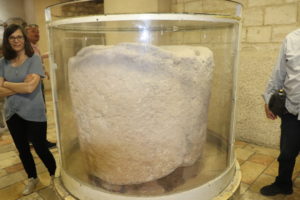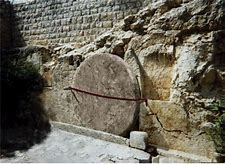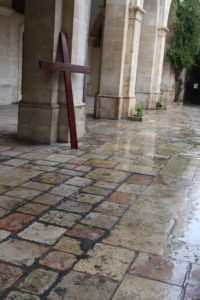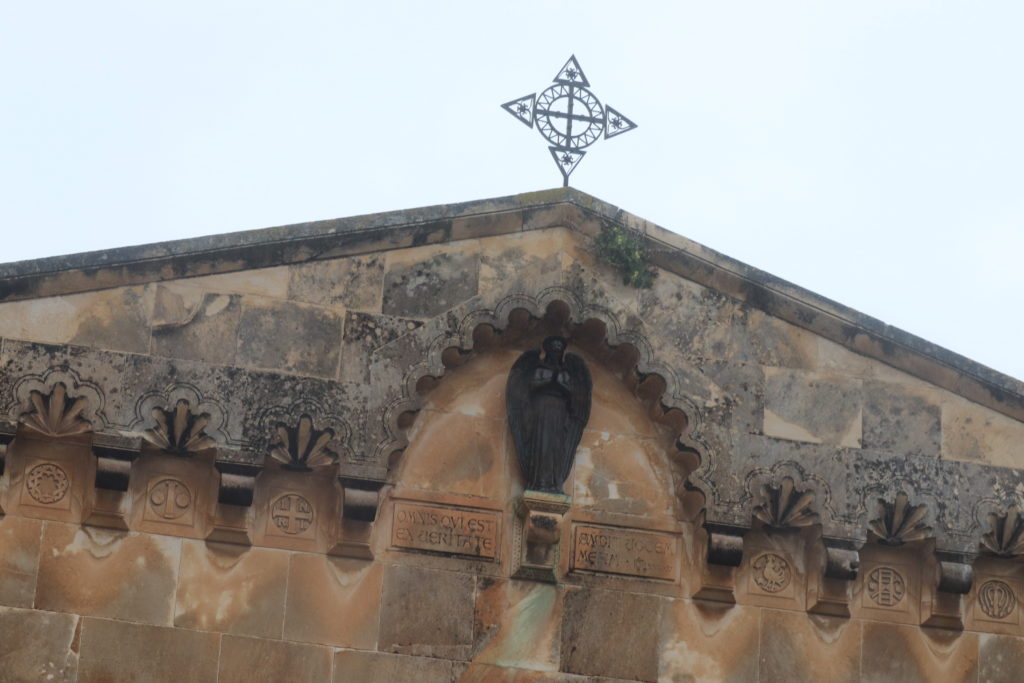by Gina Brummett | Apr 23, 2020 | Devotions

Whatever things are lovely–especially to a Grammy!
Our plan (Jim & I) was to double team some blog posts about Cultivating Joy. Two special young ladies came aboard as surprise participants, illustrating (literally) joy in the midst of adverse circumstances. Yesterday’s post by Jim highlighted faithful perseverance that produces joy – the kind of joy that spills over onto others.
Just before I sat down to write my thoughts about the practicality of Philippians (a formula for joy), I received a photo of granddaughter Emilia creating some backyard art. Please indulge a little grandmotherly bragging and a side story. Some years ago, when Emi had drawn a particularly good picture, I said, “Emi, maybe you’ll be an artist when you grow up!” Her reply: “I’m an artist now!”
It’s the craziest of times and everyone is juggling so much. Families, like that of our daughter and son-in-law, are dealing with unique job stress, working from home, doing online school, taking turns on the household computers and managing all the responsibilities of a family of five plus pets! Both adults and kids are having to adapt to many challenges these days! Needing what her mom called a “brain break”, Emilia took paint brush and palette to the outdoors and used the wood pile as her canvas.
The Apostle Paul encouraged his friends at Philippi to take a brain break from their anxious thoughts, replacing them with positive meditations. His famous “Whatevers” map out a path to peace. Whatever is true, whatever is noble, whatever is right, whatever is pure, whatever is lovely, whatever is admirable—if anything is excellent or praiseworthy—think about such things. (4:8).
It takes some effort to discipline the mind in the middle of a crisis! A good exercise is to take pen and paper and list the specific “whatevers” that apply to the situation at hand. Regarding COVID-19, for example . . .
- True: Sickness is part of our fallen world, but healing is provided in the atonement.
- Noble: Self-sacrificing individuals, particularly those in health care, are working long, hard hours for the benefit of the entire community.
- Right: I have the ability to do good for my neighbors, “preferring one another” with the love of Christ.
- Pure: There are examples all around me of kindness that comes from compassionate, pure hearts. I am grateful for the kindness that has been shown to me.
- Lovely: The virus has not overcome the blossoming Spring. All around me are signs of life.
- Admirable: I admire the gifted minds that are researching this disease and developing strategies to overcome it. I pray for God to give them insight and understanding.
- Excellent: I am grateful for businesses that have adapted efficiently and are providing me with good service under difficult circumstances.
- Praiseworthy: Leaders at all levels of government are working hard at finding solutions to this pandemic. They are criticized and second guessed, and largely underappreciated, so I will acknowledge their efforts and pray for God to lead them.
Our wonderful Christa Mele, who fills so many ministry roles at Southwest Assembly of God, shared a video testimony of how God helps her in the struggle with anxiety. She, too, combats chaos with some “brain breaks”, specifically prayer, meditation and redirecting her attention to that which brings joy. You will find Christa’s message particularly inspiring for these times!
As he wrapped up his exhortation to the Philippians, Paul said, “Whatever you have learned or received or heard from me, or seen in me—put it into practice. And the God of peace will be with you.”
by Jim Brummett | Apr 22, 2020 | Devotions
The word joy appears at least 10 times in one form or another in the book of Philippians. That is surprising, considering Paul likely wrote the letter from a Roman prison cell. Through Paul’s example we learn that joy does not depend on our circumstances, and is something we can cultivate in our own life. Let’s take a look at what Paul had to say to the Philippians.
Philippians 1:4-5 “always in every prayer of mine making request for you all with joy, or your fellowship in the gospel from the first day until now.”
The Philippian church was founded by Paul and his ministry team on his second missionary journey (Acts 16). Through the years they partnered with Paul in ministry by providing financial aid to he and his ministry team, (2 Cor. 11:9; Phil. 4:15-16) and by giving generously to help fellow Christians in Jerusalem experiencing financial hardship. The thought of their generosity was the source of Paul’s joy in our text.
My heart is filled with joy at the thought of church members who faithfully give tithes to help support the church, and give offerings to help us support missionaries and bless those in need of benevolent care. Additionally, there are many who partner with us by generously giving of their time and talents for the various ministries at our church. During the current stay-at-home orders from our government, you find these ministry partners providing on-line Bible studies, devotions, musicians leading us in worship and audio-visual techs helping us produce virtual services, as well those who connect with you by phone and email through the week.
Take a moment to think of the many ways you benefit from the individuals who use their time, tithe and talents for the glory of the Lord. Then, reach out to them via a phone call, text or email and let them know how you are blessed by their service.
For additional study on the subject of joy, consider Romans 16:4; Ephesians 1:6; Colossians 1:3; and 1 Thessalonians 1:2;
by Jim Brummett | Apr 21, 2020 | Devotions
Psalm 91:1 He who dwells in the secret place of the Most High shall abide under the shadow of the Almighty.
To dwell means to sit and stay awhile, where you go to really feel alive. As Adam Clarke wrote, “it is here we are covered with the cloud of God’s glory – the protection of the all-sufficient God.”
The Psalmist cites two fascinating places in this verse, the “secret place” and “the shadow of the Almighty. In my mind, they are one and the same. This is that special place where you get alone for an encounter with God. For Daniel it was a room in his home (Daniel 6), for Elijah it was a cave (1 Kings 19), for Jesus it was the Mount of Olives and for the disciples it was an upper room.
Perhaps it is a secret place because it is where you go to be alone with God, where you shut out all the concerns of life and bask in His incredible presence. It is here where you get a change of perspective from how unfair life is to how good God is, from how big the problem is to how big God is. It was here the Psalmist described God as “the Most High” and “the Almighty.”
Let’s sing: “Shut in with God in a secret place, there in the Spirit beholding His face…”
by Jim Brummett | Apr 20, 2020 | Devotions
2 Kings 19:1 And so it was, when King Hezekiah heard it, that he tore his clothes, covered himself with sackcloth, and went into the house of the LORD.
Threats come in various forms. For Hezekiah, it was a letter from an Assyrian general stating his intent to invade his land, steal his property and kill his people. As king of Judah, Hezekiah had successfully dealt with other threats, but this was no ordinary threat. The Assyrians had taken control of all land and people from the Mediterranean Sea to the Persian Gulf. Let’s review the general’s threats and see if it sounds familiar to you.
“On whom are you depending” (v.20)? This was a threat designed to undermine Hezekiah’s confidence in God’s ability and willingness to meet his needs. “Make a bargain with me” (v.23). This was the threat of compromise. “Do not let Hezekiah persuade you to trust in the Lord” (v.31). This was the threat of trying to silence the voice of faith in God.
Hezekiah knew he did not have the resources to defeat the Assyrians, but he knew who did. In chapter 19 he turned to the Lord in prayer. First, he took the letter (threat) and laid it on the altar in the temple and presented it to God. If you are wrestling with threats to your finance, health or relationships, go to the altar and lay it before the Lord. A portion of Hezekiah’s prayer is quite telling. In verse 15 it states, “O LORD God of Israel, the One who dwells between the cherubim, You are God, You alone, of all the kingdoms of the earth. You have made heaven and earth.” Hezekiah knew a pagan general in a chariot was no match for Almighty God who sits on the throne in heaven. This reminds me of Isaiah’s bold statement in 54:17 “No weapon formed against you shall prosper, and every tongue which rises against you in judgment you shall condemn.” (Isaiah 54:17).
Another important principle is found in 19:2, when Hezekiah invited others like the prophet Isaiah to join with him in intercessory prayer. My friend, you do not have to face your battle alone. You can call me, text me or email me and we can face this battle together. I assure you there are many other friends who are eager to join with you in your journey. I look forward to hearing from you.
In closing I would like to offer a prayer for you, adapting part of Hezekiah’s prayer in 2 Kings 19:14-19.
“O LORD God who dwells between the cherubim, you alone are God. You made the heavens and the earth. Incline your ear and hear our prayers; open your eyes & take note of the threat we face today. I come against the issues that threaten your Church and your people. Let all the people of our community know you are the source for our hope, our peace and our victory. Let all men take note that you alone are God. Amen!”
Let’s sing: “When your enemy presses in hard do not fear, the battle belongs to the Lord. Take courage my friend your redemption is near, the battle belongs to the Lord…”
by Gina Brummett | Apr 17, 2020 | Devotions

“Nearby stood six stone water jars, the kind used by the Jews for ceremonial washing, each holding from twenty to thirty gallons.” (John 2:6) Photo by Gina Brummett, 2020, Stone water jar in Cana, Israel
“Listen to my Son.” God the Father said it; Mary the mother of Jesus said it; and Jesus, himself said, “Hear me.”
Matthew’s gospel records a fascinating story that has been labeled “The Transfiguration” because Jesus’ appearance was changed right in front of his inner circle of friends. (ch. 17)
After six days Jesus took with him Peter, James and John the brother of James, and led them up a high mountain by themselves. There he was transfigured before them. His face shone like the sun, and his clothes became as white as the light. Just then there appeared before them Moses and Elijah, talking with Jesus. . . While he was still speaking, a bright cloud covered them, and a voice from the cloud said, “This is my Son, whom I love; with him I am well pleased. Listen to him!” (Matthew 17)
It wasn’t the first time the disciples had heard similar words. Here on the Mount of Transfiguration –if they were clear-headed enough to remember it– they may have recalled another day when they had heard, “Listen to my son.” That time they were attending a wedding with Jesus and almost witnessed a ruined reception when the beverages ran out.
(From John, ch 2) “..a wedding took place at Cana in Galilee. Jesus’ mother was there, and Jesus and his disciples had also been invited to the wedding. When the wine was gone, Jesus’ mother said to him, “They have no more wine.”
“Woman, why do you involve me?” Jesus replied. “My hour has not yet come.”
His mother said to the servants, “Do whatever he tells you.”
The obedience of the servants saved the day as they participated in Jesus’ first miracle. The transformation of water to wine was done discreetly, but it was done in full view of the disciples and, apparently, as much for their benefit as for the wedding party and guests.
Through this miracle, Jesus “revealed his glory, and his disciples put their faith in him.” (See John 2:6-11)
When the disciples heard God’s voice on the mountaintop, they fell facedown , terrified but fully persuaded to listen to Jesus’ words that followed “Get up. Don’t be afraid.”
These two stories should compel us to listen to what Jesus says to us. Now, while you likely have some extra time at home -avoiding coronavirus- take the opportunity to research the “red letters”.* A transformation greater than “water to wine” happens for those who will “do whatever he tells you”. (i.e. Repent, Forgive, Love, Believe, Follow……) Hearing and obeying have a great outcome: “Everyone then who hears these words of mine and does them will be like a wise man who built his house on the rock.” Matthew 7:24
While we are not in the same position as the disciples to see Jesus’ physical features change in front of us, we do have the opportunity to behold His glory with greater clarity every day.
The Son says, “Get up. Don’t be afraid.”
*Jesus’ words typically printed in red in most editions of the New Testament. Click here for a compilation of “red letter” verses.
by Jim Brummett | Apr 16, 2020 | Devotions
Genesis 1:1-5 In the beginning God created the heavens and the earth. 2 The earth was without form, and void; and darkness was on the face of the deep. And the Spirit of God was hovering over the face of the waters. 3 Then God said, “Let there be light”; and there was light. 4 And God saw the light, that it was good; and God divided the light from the darkness. 5 God called the light Day, and the darkness He called Night. So the evening and the morning were the first day.
.“In the beginning God…” God existed before there was any concept of time, before there was a solar system, or earth, air, water, plants, animals, angels or man. God was before anything and anyone. He was there in the beginning of your life and even marked you with His image and for His purpose. You will find him at the beginning of each day, ready to just spend time with you, and guide you through the day.
“God created the heavens and the earth.” The amplified version states God prepared, formed, fashioned and created the earth. In verse one it just says God created. Beginning in verse three it tells how He created, by speaking every part of creation into existence. He spoke life into existence. However, when it came to man, He didn’t just speak man into existence, He gave special attention to create him (you and me) in His own image.
“The earth was without form, and void; and darkness was on the face of the deep. And the Spirit of God was hovering over the face of the waters. Then God said, “Let there be light”; and there was light.”
Something significant happened between verses one and two. Verse one states God created and verse two describes darkness and a void. Something incredibly exciting is described in verse two where it states the Holy Spirit hovered, or brooded over the face of the water, the void and darkness, then God began to speak creation into existence one stage at a time. God created, He spoke, He brooded and each time He brought forth life.
Let us take the time to allow the Holy Spirit to just brood in our life and our home. If we feel chaos, He will bring life. If we feel a void, He will bring life.
Consider these verses for your meditation.
Isaiah 40:31 But those who wait on the LORD Shall renew their strength; they shall mount up with wings like eagles, they shall run and not be weary, they shall walk and not faint. To wait means to bind together, perhaps by twisting; to gather together; to patiently wait.
Psalm 37:7 Rest in the LORD, and wait patiently for Him; do not fret because of him who prospers in his way, because of the man who brings wicked schemes to pass. To rest means to be astonished; to stop; to be silent; to wait.
Let’s sing: “Here I am waiting, abide in me I pray; here I am longing for you. Hide me in your love, being me to my knees; may I know Jesus more and more…”
by Jim Brummett | Apr 13, 2020 | Devotions
Revelation 1:10-11 I was in the Spirit on the Lord’s Day, and I heard behind me a loud voice, as of a trumpet, 11 saying, “I am the Alpha and the Omega, the First and the Last,” and, “What you see, write in a book and send it to the seven churches which are in Asia: to Ephesus, to Smyrna, to Pergamos, to Thyatira, to Sardis, to Philadelphia, and to Laodicea.
A renewed appreciation of this text is realized when we consider the circumstances. The Roman government had sentenced John to hard labor in the quarries on Patmos Island, a rocky, treeless, 10-mile long island about 60 miles southwest of Ephesus. He was as exile and prisoner, not for any guilt of his own but because of his faithful proclamation of God’s Word.
There are several of you who receive these daily devotional who are going through a difficult season. I want to offer to you some words of encouragement from Revelation chapter 1.
In verse 1 John received a vision of “things which will shortly take place.” I pray for God to help you look beyond the challenges of today, and birth within you a conviction that He is preparing to do something exciting in your life.
In verse 7 he wrote “He [Jesus] is coming.” Talk about something exciting to meditate on, consider the fact that the Lord’s return could be any day.
In verse 11, John was given the assignment to “write what you see and send it to the churches.” Simply stated, God was telling John He was not finished with him. Out of the abandonment and persecution would come an opportunity for ministry to seven churches scattered throughout western Turkey. You may have heard the enemy whisper in your ears, “you’re washed up…you don’t have any ministry left in you…you are done.” Rejoice my friend, for God has not written the final chapter and He still has something He wants you do to do for Him.
Finally, in verses 12 and following, John wrote of receiving a fresh and new glimpse of Jesus. I wonder if the image of Jesus John received at that time reminded him of what he saw when he was with Jesus on the Mount of Transfiguration in Matthew 17. My friend, I pray for God to give to you a fresh and new glimpse of the glory of the Lord.
Let’s sing: “I feel Jesus. I feel Jesus. I feel Jesus in this place. Yes by soul does burn within me. I feel Jesus in this place.”
by Jim Brummett | Apr 11, 2020 | Devotions
 Jesus’ body was placed in the tomb Friday. Romans soldiers guarded it through the day on Saturday (Sabbath). Sabbath ended 6pm & his body was ceremonially treated for burial with spices purchased by Nicodemus (John 19:39-40).
Jesus’ body was placed in the tomb Friday. Romans soldiers guarded it through the day on Saturday (Sabbath). Sabbath ended 6pm & his body was ceremonially treated for burial with spices purchased by Nicodemus (John 19:39-40).
Nicodemus (like Joseph of Arimathea) was a member of the Sanhedrin, the court that had condemned Jesus to death. Neither of them were present during Jesus’ trial. Both men lived as secret followers of Jesus, afraid to make a public profession of faith because of their prominent position in the community. Both men were affected by Jesus’ death, came out of hiding, risking their reputation and lives to do so.
While Jesus’ physical body lay in the tomb, He paid the penalty for sin by offering the perfect, spotless sacrifice. He conquered death, both spiritually and physically, securing our salvation. “For you know that God paid a ransom to save you from the empty life you inherited from your ancestors. And the ransom he paid was not mere gold or silver. He paid for you with the precious lifeblood of Christ, the sinless, spotless Lamb of God.” (1 Peter 1:18-19 NLT).
Let’s sing: “Jesus paid it all, all to Him I owe; sin had left a crimson stain He washed it white as snow…”
by Jim Brummett | Apr 10, 2020 | Devotions
 Friday of Holy Week was a day of death. Early Friday morning, Judas, overcome with remorse for betraying our Lord, hanged himself.
Friday of Holy Week was a day of death. Early Friday morning, Judas, overcome with remorse for betraying our Lord, hanged himself.
By 9am, Jesus had been falsely accused, condemned, mocked, beaten and abandoned. Soldiers spit on Him, tormented Him, and pierced His head with a crown of thorns. He was sentenced to death by crucifixion, one of the most horrible and disgraceful methods of capital punishment known at the time. He carried His own cross to Calvary where He was again mocked & insulted as Roman soldiers nailed Him to a wooden cross. Jesus’ first words on the cross: “Father, forgive them, for they do not know what they are doing” (Lk. 23:34 NV). His last words were “Father, into your hands I commit my spirit” (Lk. 23:46). By 3:00, He died. Around 6pm, Nicodemus & Joseph of Arimathea took Jesus’ body down from the cross and lay it in the tomb.
Let’s sing: “At the cross, at the cross, I surrender my life, I’m in awe of You, I’m in awe of You. Where Your love ran red and my sin washed white, I owe all to You, I owe all to You, Jesus.”
Scripture reading for Friday: Matthew 27:1-62, Mark 15:1-47, Luke 22:63-23:56, and John 18:28-19:37.

(Jerusalem) The Church of the Flagellation is a Roman Catholic church and Christian pilgrimage site located in the Muslim Quarter of the Old City of Jerusalem, Lions, Gate. This church marks the Second Station of the Cross and spot where Jesus Christ was flogged by Roman soldiers before his journey down the Via Dolorosa to Calvary. (Photo March 2020, Gina Brummett)
by Jim Brummett | Apr 9, 2020 | Devotions
Thursday of Holy Week was a day of agony for our Lord. The day started with him sending two of his disciples to prepare the upper room in Jerusalem for the Passover meal. In the evening He took a towel and basin and washed the feet of his disciples, demonstrating how believers should humble themselves and love one another. He shared the feast of Passover with disciples. As the Lamb of God, He was fulfilling the meaning of Passover by giving his body to be broken and blood to be shed in sacrifice, freeing us from sin and death. He instructed His followers to continually remember His sacrifice by sharing elements of bread and wine.
.After dinner he led the disciples into the Garden of Gethsemane at the Mount of Olives where He prayed. Luke 22:44 states that as He prayed “his sweat became like great drops of blood falling down to the ground.” His time of prayer was interrupted when Judas and a mob armed with swords and clubs, sent by the chief priests and elders of the people came and arrested him. He was taken to the home of Caiaphas the high priest where members of the Sanhedrin gathered to bring their accusations against him. There are twelve reasons why his arrest, trial and conviction were illegal.
- He was arrested without any formal charges presented against him.
- His trial was at night, when the law required it to be held during daylight.
- The Jewish law prohibited the Sanhedrin from originating changes.
- No witnesses were permitted to testify on his behalf.
- Jewish law did not permit the trial of a capital offense to begin on the day before the annual Sabbath of the Feast of Unleavened Bread.
- His trial was concluded in one day, when Jewish law stated that if a sentence of death was to be pronounced, the case cannot be concluded before the following day.
- Two false witnesses charged him with saying he would destroy the temple made with hands, yet the court condemned him on another false charge – blasphemy. According to the Jewish law, a person could not be condemned on his own testimony.
- The merits of His defense were not considered. Instead, the court pronounced sentence instantly and unanimously.
- Members of the court made sure the trial was completed before members like Joseph of Arimathea who would have voted against condemnation were present.
- The sentence was pronounced in the home of the high priest, when the law stated a death sentence could be pronounced only in the court’s appointed place.
- Most of the judges were known enemies of Jesus, when Jewish law called for judges to be impartial.
- The court legally switched the charges from blasphemy to treason before Pilate, a Roman crime, so the Romans would be responsible for his death. No evidence of treason was presented.
It was the immeasurable love of Christ that drove Him through the day of agony. I love, He washed the feet of the one who would betray him, and the one who would deny him. In love He gave himself over to the sentence of death, to die for the sins of all men including those who worked feverishly to have him killed. He was driven by His love for you and me.
Let’s sing: “For me it was in the Garden, He prayed “Not my will but Thine.” He had no tears for His own griefs but sweat drops of blood for mine. How marvelous, how wonderful! And my song shall ever be. How marvelous, how wonderful, is my Savior’s love for me.”
Scripture reading for Thursday: Matthew 26:17–75, Mark 14:12-72, Luke 22:7-62, and John 13:1-38.



 Jesus’ body was placed in the tomb Friday. Romans soldiers guarded it through the day on Saturday (Sabbath). Sabbath ended 6pm & his body was ceremonially treated for burial with spices purchased by Nicodemus (John 19:39-40).
Jesus’ body was placed in the tomb Friday. Romans soldiers guarded it through the day on Saturday (Sabbath). Sabbath ended 6pm & his body was ceremonially treated for burial with spices purchased by Nicodemus (John 19:39-40). Friday of Holy Week was a day of death. Early Friday morning, Judas, overcome with remorse for betraying our Lord, hanged himself.
Friday of Holy Week was a day of death. Early Friday morning, Judas, overcome with remorse for betraying our Lord, hanged himself.